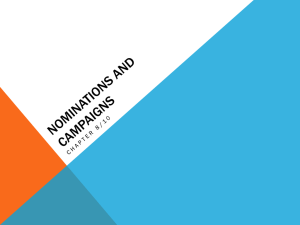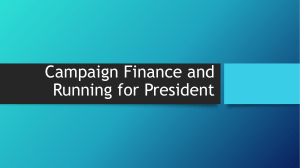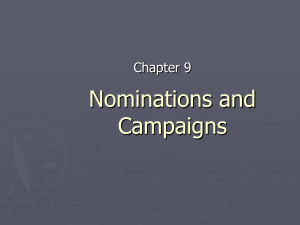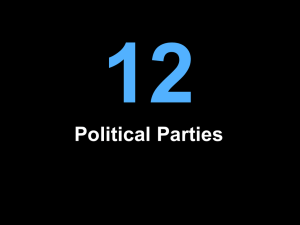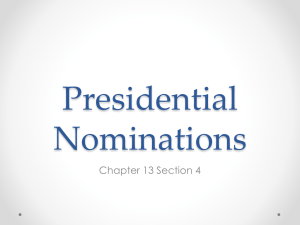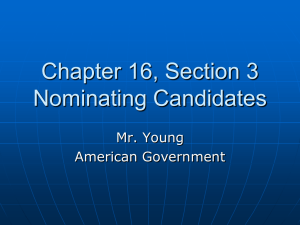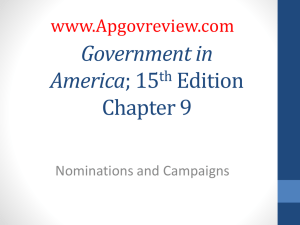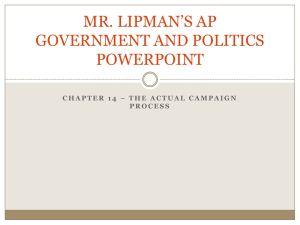Chapter 9
advertisement
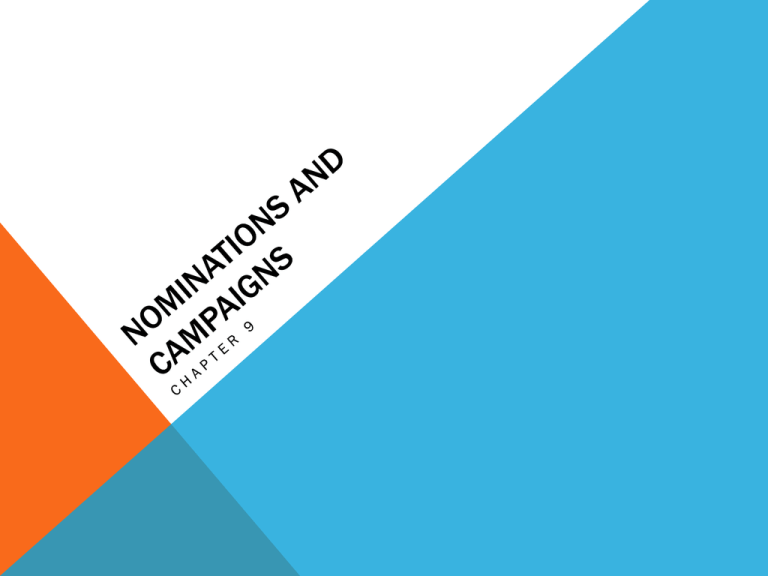
THE NOMINATION GAME Nomination: The official endorsement of a candidate for office by a political party. THE NOMINATION GAME The Long Campaign Other countries have short campaigns- generally less than 2 months. U.S. campaigns (especially for President) can last 18 months or more. And it seems to be getting longer each year! THE PARADOX OF CAMPAIGNS Candidates must appeal to people further from the political center in the primaries and caucuses, but must later appeal to the center in the general election. THE NOMINATION GAME: COMPETING FOR DELEGATES Some states use the caucus method of sending delegates to national convention. Caucus: Formerly meetings of party leaders, these are now meetings of party members used to select delegates and nominees. Now organized like a pyramid from local precincts to the state’s convention. Local caucuses --- > district convention ---> state convention ---> national convention. Each level selects delegates to attend higher level. Iowa’s is first and is considered the most important. THE NOMINATION GAME: COMPETING FOR DELEGATES Primary: Elections in which voters choose the nominee or delegates pledged to the nominee. 3 Types of Primaries Open Closed Blanket New Hampshire is the first primary CHOOSING DELEGATES The McGovern Fraser Commission in 1968 wrote new rules to increase the number of female and minority delegates in the Democratic Party Superdelegates are awarded seats based on the office they hold, such as being a member of Congress. They bring experience and represent the elite. TYPES OF PRIMARIES Open primaries allow party members and non affiliated voters to vote. Independents may vote, voters get ballot of any one party they wish crossing of party lines allowed --> danger of 'raiding.’ Closed primaries allow only party members to vote. Used in most states. Only registered party members can vote for partisan offices, no crossing of party lines. Blanket (“free love"): Independents may vote, voters can "mix and match” their votes (vote for candidates of different parties for different offices) THE NOMINATION GAME: CRITICISMS (BUT THE CANDIDATES WILL DEFEND THE SYSTEM) 1. Marathon Campaigns Disproportionate attention to the early ones.(Iowa and NH). Money plays too big a role. Participation in primaries and caucuses is low and voters are more extreme. 2. Frontloading a state holds its primary early to capitalize on media attention. Politicians can’t do their duties when running Money plays too big of a role Regional factors are exaggerated and participation is low- leads to extreme voters 3. Super Tuesday Southern states moved their primaries to same day in March Lots of media attention and money too big of a role ANALYSIS OF PRESIDENTIAL NOMINATING SYSTEM. Pro Highly participatory.- caucuses, primaries, conventions. Highly representative. Weeds out weaker candidates. Con Low rates of turnout. Costly. Too lengthy. Does not test candidates for qualities they need as President. Too much emphasis on media game. Delegates at caucuses and conventions tend to be unrepresentative: more ideological, more activist, more educated, less moderate, much more wealthy. FRONT-LOADING IN THE DELEGATE SELECTION PROCESS THE NOMINATION GAME: SUGGESTIONS TO FIX THE SYSTEM National Primary Primary on same day A run off between the top two in each party would then be held shortly thereafter Regional Primary States in each time zone would vote once a week for a month Advantage goes to the time zone that goes first CONVENTIONS Have lost their drama. Winner is known beforehand. emphasis on ‘image' instead of 'scrimmage,' 'ratification rather than nomination.' Selection of VP nominee. Chosen by pres. nominee and rubber stamped by convention. 'Balancing the ticket.' Have lost their viewers. Networks aren’t showing as much. 1964 Democratic Convention Viewers of 2004 convention: 22 million (covered by all major broadcast and cable news channels) Viewers of a single episode of 2004 Survivor: 58 million (covered by CBS) 2004 Democratic Convention CONVENTIONS Are still important to the party to get the base organized and motivated (Pep Rally). Conventions are carefully scripted and they develop positions and promote political representation. Day 1: Keynote speech Day 2: Party platform: Statement of its goals and policies and general beliefs. Day 3: Official nominations and candidate speeches. Goal: Reconciliation and unification of party by end of convention. THE CAMPAIGN GAME Technology has changed the nature of political campaigns Moving away from attending political rallies to connecting with the candidates through TV and the Internet Goal is to use the media to get attention Direct Mail Locating potential supporters by sending information and a request for money to huge lists of people who have supported candidates of similar views in the past Organizing the Campaign (Going to needs LOTS of $$$$$$$$$) Get a campaign manager Get a fund raiser Get a campaign counsel Hire media and campaign consultants Assemble a campaign staff Plan the logistics Get a research staff and policy advisors Hire a pollster Get a good press secretary Establish a website MONEY AND CAMPAIGNING The early 1970s represented a time when Congress attempted to take back power from the Executive Branch Believed LBJ & Nixon had expanded the power of the Presidency too much Gulf of Tonkin Resolution (War Powers Act) Watergate and HUGE illegal campaign contributions MONEY AND CAMPAIGNING Federal Election Campaign Act of 1974 FEC: Created by law in 1974 to administer campaign finance laws for federal elections. Public financing of presidential elections (matching funds) Limited spending & required disclosure Limited contributions to campaigns Soft Money Contributions (with no limits) used for party-building expenses or generic party advertising BUCKLEY V. VALEO (1976) The Supreme Court ruling upheld part of the act and struck down part of the act as unconstitutional. They upheld: Limits on individual contributions (hard money) Disclosure and reporting of contributions requirement They struck down: Limits on campaign spending Limits on using personal/family resources Limits on independent spending (soft money) THE PROLIFERATION OF PACS Definition: Created by law in 1974 to allow corporations, labor unions and others to donate money to campaigns. Over 4200 PACs donating over $288 million to Congressional Candidates alone in 2006 Number of these has sextupled since 1974. Contributions of these to congressional candidates have risen by more than tenfold. Percentage of campaign money from PACs has also risen dramatically. Donate to candidates who support their issue, regardless of party affiliation Not sufficient data that PACs “buy” candidates BIPARTISAN CAMPAIGN FINANCE REFORM ACT McCain Feingold Act (2002) Eliminated soft money Set limits of $2000 for individual contributions and $5000 for PACs, indexed for inflation. Banned independent ads 30 days before primaries and 60 days before a general election 527S AND 501(C)S 527s are independent organizations that run ads that are not sponsored by a political party or a candidate. They can spend unlimited amounts of money. 501(c) groups allow donors to remain anonymous. They cannot spent more than half of their funds on political activities. http://thedailyshow.cc.com/v ideos/1907r0/so-you-wantto-bee-a-------527organization CITIZENS UNITED V. FEC (2010) 527s and 501(c) groups are considered to be persons under the law, with free speech rights. The 30 and 60 day limits on ads were ruled to be unconstitutional violations of the First Amendment. SUPERPACS • Officially known as “independent expenditure only committees,” Super PACS may engage in unlimited spending independent of candidate and parties. • They can raise funds from corporations, unions, and other groups without limits. http://thecolbertreport.cc. com/videos/av6bvx/colber t-super-pac---coordinationresolution-with-jon-stewart MCCUTCHEON VS. FEC (2014) • Federal aggregate limit is set at $117,000 per election (total amount you can donate to all federal candidates) • McCutcheon wants to give more than $117,000 • Supreme Court rules for McCutcheon • Got rid of aggregate limit but kept in place the limit on individual contributions to each candidate set under McCain/Feingold ($2600 per election) • “The government may no more restrict how many candidates or causes a donor may support than it may tell a newspaper how many candidates it may endorse”- Chief Justice John Roberts BIG PICTURE OF CAMPAIGN FINANCE • 1974 law is still around • FEC is still around • PACs are still around • McCain/Feingold tried to limit the amount of money in politics- banned soft money • Hydraulic Theory of Money • 527s • Citizens United • Super PACs • What is the role of money in politics? • Does it have a corrupting power? 3 IMPACTS OF CAMPAIGNS AND SOME OTHER STUFF 1. Reinforcement of voters’ preferences for candidates 2. Activation- getting supporters to contribute money or ring doorbells 3. Conversion- changing the minds of voters (rarely happens) • Selective Perception- voters pay attention to what they already agree with • Party Identification still influences voters • Incumbent advantage • Campaigns are getting longer • Today they promote individualism • Campaign promises mean more government spending and programs
